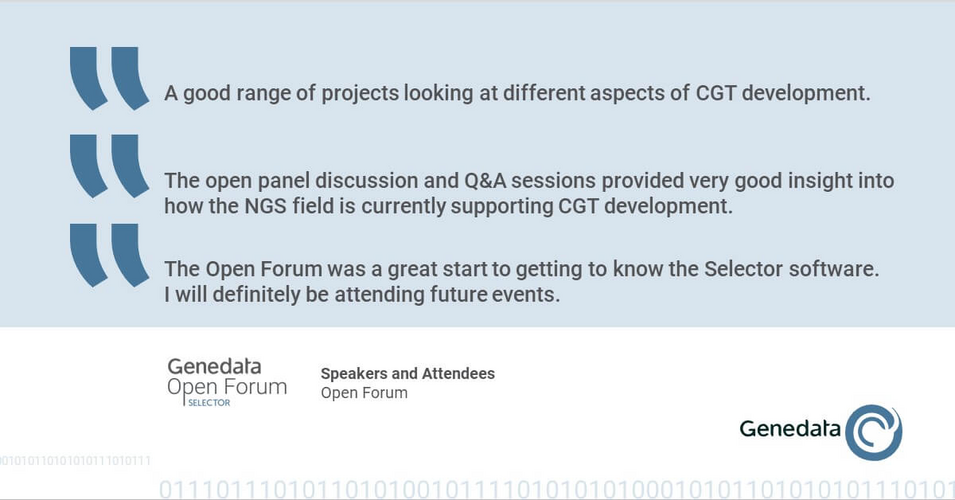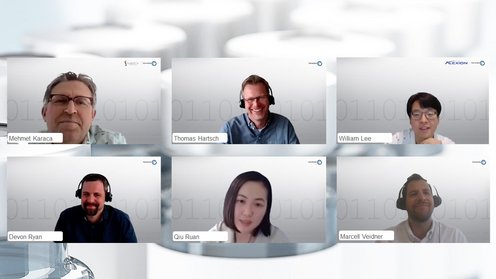Knowledge Exchange to Accelerate Gene Therapy Product Development and Characterization
June 29, 2023
Marie-Ange Kouassi
As complex CGTs get closer and closer to the bedside, ensuring they maintain the right critical quality attributes (CQAs) to safely achieve their desired therapeutic benefit is essential. NGS is expected to become a game-changing multi-attribute method to allow biopharmaceutical companies to establish and monitor CQAs throughout development and manufacturing yet there is still a need for standardization as well as knowledge and best-practice exchange for companies to unlock this technique’s full potential.
Experts from leading biopharmaceutical companies around the world gathered on the 29th of June 2023 at the 7th Genedata Selector Virtual Industry Workshop with attendees from over 30 companies. This open forum co-hosted by Sarepta Therapeutics, a company at the forefront of genetic medicine, served as a platform to disseminate knowledge as well as experiences implementing Next-Generation Sequencing (NGS) for gene therapy development. As a technique that enables the development of innovative biotherapeutics faster and more effectively, significant innovation has occurred in this area over the past few years with regulatory authorities like the FDA and the EMA increasingly supporting its use and approving treatments characterized using NGS. To facilitate its wider adoption and further support companies, Genedata brought together experts to learn from each other through a series of engaging talks and an interactive panel discussion. At the event, discussions were centered on the evolution of sequencing technology, AAV vector manufacturing, GxP validation, and the assessment of critical quality attributes such as identity, potency, and safety.
To kickstart the event, co-host, Mehmet Karaca, and Associate Director of Molecular Biology – Sequencing and Analytical Development at Sarepta Therapeutics provided insights on the use of NGS in gene therapy product characterization. He began his talk by sharing an overview of the AAV vector manufacturing workflow highlighting the different steps (upstream, downstream, and formulation) at which NGS can be implemented in replacement of Sanger sequencing providing crucial information and a clearer picture to support data-informed decision-making. During a brief overview of the history of sequencing technology, Mehmet emphasized the benefits of NGS such as greater accuracy and higher throughput, some reasons why this technique was implemented at Sarepta. While describing a typical NGS workflow, Mehmet shared the goal of Sarepta to have a validated method and data analysis pipeline which complies with regulatory organizations. In addition, he mentioned the importance of partnering with an experienced vendor that is agile, responsive, and technically knowledgeable enough to support the interpretation of results from NGS assays. To conclude his talk, Mehmet shared the typical manufacturing workflow of AAV vectors at Sarepta and the type of NGS-driven characterizations performed. These included transgene identity and integrity assessment, adventitious agent detection, and the detection of any partial products to name a few.

With a focus on leveraging NGS to understand the impact of process changes on AAV vector quality, William Lee, Senior Research Associate at Alexion Pharmaceuticals, a subsidiary of AstraZeneca, gave an interesting and informative talk detailing efforts to develop a gene therapy treatment against a rare, life-threatening genetic disorder. He shared a unique approach to integrating genes into patient genomes and described the gene therapy product manufacturing process used by his team. This process which involved standard triple transfection in HEK 293 cells, was further optimized using upstream changes to increase bioreactor titers in a scalable and GMP-friendly manner with the substitution of certain steps with alternative techniques. These process improvements had an impact on titer, product potency, purity, and the ratio of full, empty, and partial capsids produced. NGS was used to investigate these differences and identify their root cause by assessing read coverage, truncated transgenes, and heterogeneity in package DNA. Participants at the open forum were highly interested in William’s talk and asked a range of questions regarding regulatory submissions, method development, and results gained from NGS-based experiments undertaken in this study.
Continuing on the theme of NGS data analysis and interpretation, Qiu Ruan, Scientific Consultant at Genedata Selector, gave the next presentation. Her talk included a live demonstration of the Genedata Selector® platform showing how it breaks down the complexity of NGS data analysis supporting efficient decision-making through automation, sample tracking, and clear go/no-go signals. Qiu showed how NGS data can be analyzed to derive multiple outputs allowing the assessment of several attributes simultaneously. For quality control, production batches can be assessed using NGS to perform variant detection. Following this, the same sample can be used to identify contaminants such as residual plasmids, host cell DNA, or viruses. Qiu elaborated on how additional assays can be performed using long-read sequencing to characterize the molecular state of the AAV genome allowing to identify fusions or truncations. Next, she showed how the platform-agnostic software provides a unified overview of results registered into the system with their metadata. She showed how the Playbooks, a simplified, user-friendly interface to complex NGS analysis workflows, automate and guide users through advanced analyses while linking all results back to the sample. Important for decision-making, Selector provides an audit trail and enables deep exploration of samples that failed quality checks based on previously defined thresholds. All data, reference sequences, results, and reports associated with a single experiment are accessible from a single point in Genedata Selector, allowing for full transparency and effective collaboration.
Genedata’s 7th Virtual Open Forum concluded with a panel discussion including all speakers, participants from the audience, and a scientific expert from Genedata Selector. Mehmet shared how the use of NGS was introduced at Sarepta and how its application has evolved within the organization. He mentioned that partnering with Genedata has been a great step in advancing their progress as they work towards developing a validated method and a data analysis pipeline as well as producing reports for regulatory submissions. He also highlighted that comprehensive gene therapy product characterization is crucial for ensuring patient safety and developing treatments that improve quality of life. Other topics discussed by panelists were the benefits and shortfalls of different sequencing technologies- it was concluded that this should be selected based on the task at hand. For example, for variant detection, one would want to consider a specific type of sequencing technology that is sensitive enough. Attendees had the opportunity to drive the panel discussion by participating in the interactive polls. The results of these live surveys provided valuable insights regarding the current state and focus of NGS-based development and manufacturing of gene therapies. The interactive nature of the event allowed participants to share their experiences and perspectives, contributing greatly to the knowledge exchange during this industry workshop. Overall, the event was very insightful and left participants feeling motivated about leveraging NGS for gene therapy product characterization and quality control.
Genedata Selector’s Industry Open Forums occur regularly to address the challenges of NGS-based assays in CGT development and manufacturing, biosafety testing, and cell line development. Join this exclusive community by registering your interest to attend upcoming events.
